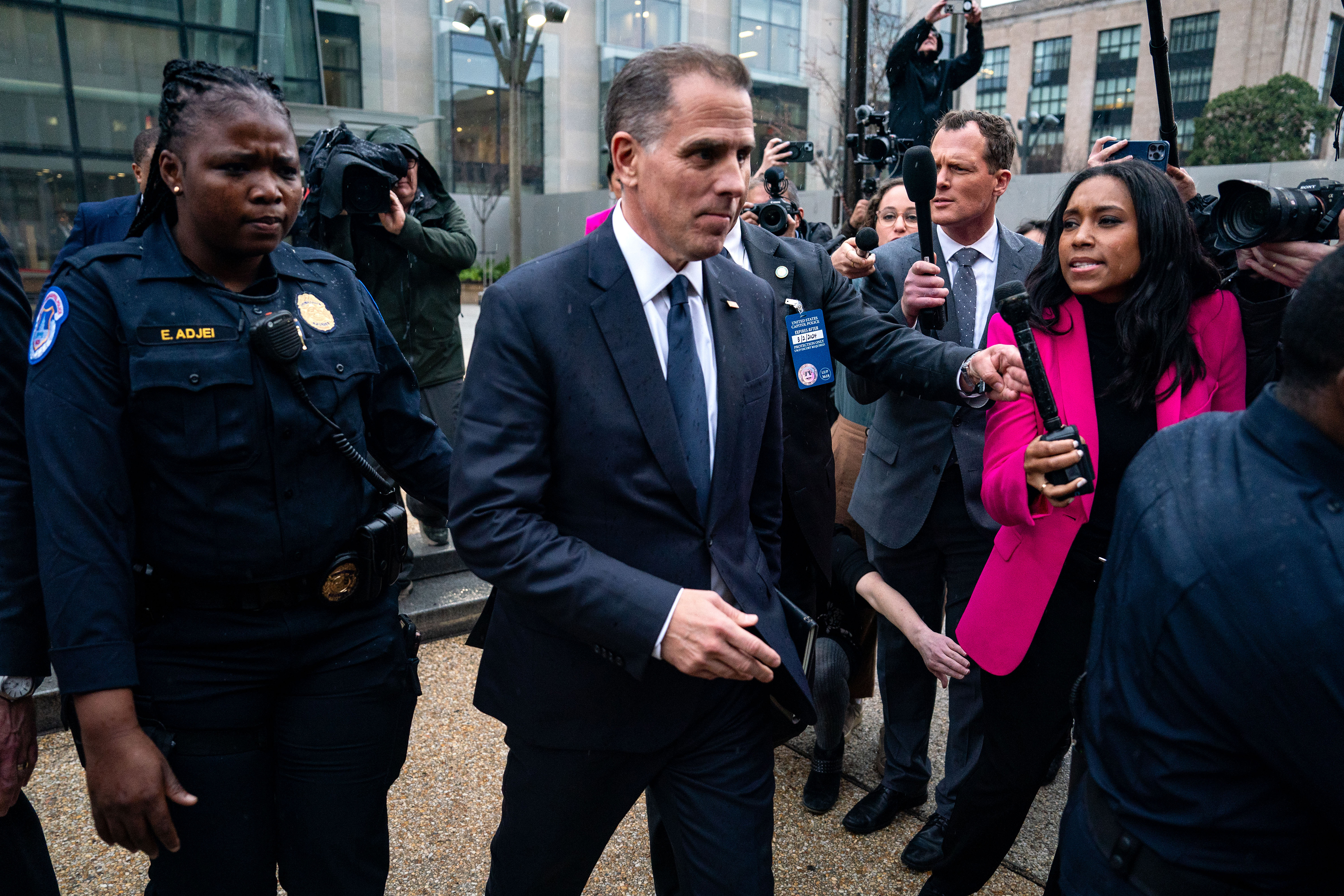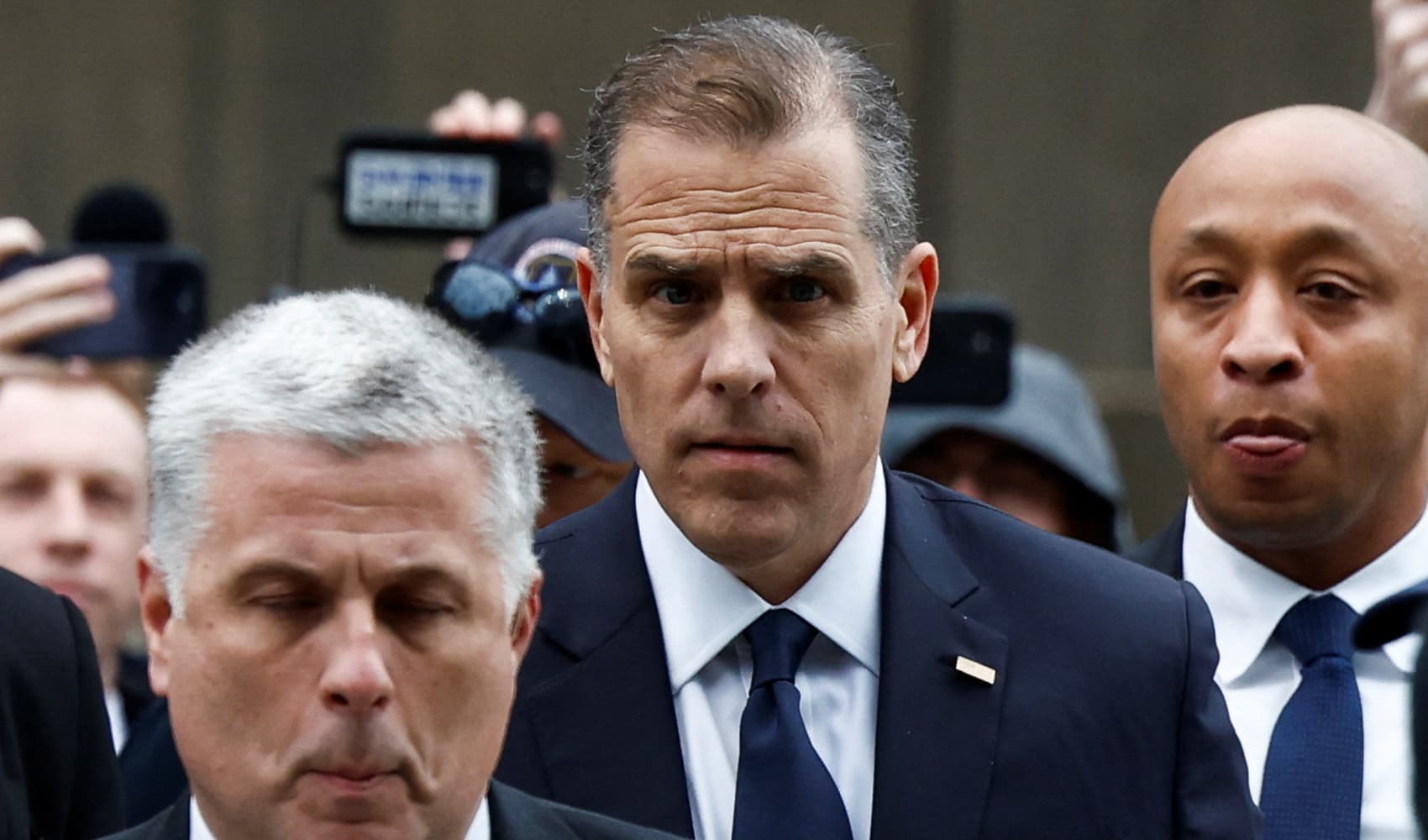Federal prosecutors on Tuesday painted President Joe Biden’s son Hunter as a “drug addict” whose dark habits ensnared loved ones and who knew what he was doing when he lied on federal forms to purchase a gun in 2018 by saying he wasn't in the throes of addiction.
Meanwhile, Hunter Biden's attorney said he would call the president's brother James Biden as a witness. James and Hunter are close, and the uncle helped his nephew through rehab stints in the past.
“You will see that he is not guilty," attorney Abbe Lowell said.
Hunter Biden has been charged with three felonies stemming from the purchase when he was, according to his memoir, addicted to crack. He has been accused of lying to a federally licensed gun dealer, making a false claim on the application by saying he was not a drug user and illegally having the gun for 11 days.
Prosecutors told the jury in their opening statement that Hunter Biden was trying to score drugs just days after he lied on the form, telling his brother’s widow in a message that he was waiting for a drug dealer. They also played for jurors an audio excerpt of his 2021 memoir “Beautiful Things” in which he talked about going back to Delaware around the time of the gun purchase.
“No one is allowed to lie on a federal form like that, even Hunter Biden,” federal prosecutor Derek Hines said. “He crossed the line when he chose to buy a gun and lied about a federal background check ... the defendant’s choice to buy a gun is why we are here."
Get Tri-state area news delivered to your inbox. Sign up for NBC New York's News Headlines newsletter.
“When the defendant filled out that form, he knew he was a drug addict,” and prosecutors don't have to prove he was using that day, Hines said.
Hines added: “Addiction is depressing," but Hunter Biden's addiction isn't the reason for the case.
The proceedings come after the collapse of a deal with prosecutors that would have avoided the spectacle of a trial so close to the 2024 election. Hunter Biden has pleaded not guilty and has argued he's being unfairly targeted by the Justice Department after Republicans decried the now-defunct plea deal as special treatment for the Democratic president's son.
First lady Jill Biden and his sister Ashley Biden, who attended Monday's court session, joined him in the courtroom again as opening statements began. Hunter Biden's exes are also expected to testify on embarrassing and personal details about addiction.
Lowell said the form asks whether you “are” a drug user. “It does not say ‘have you ever been,’" and he suggested the president's son did not think of himself as someone with a drug problem when he purchased the gun.
And his state of mind should be considered at the time of the purchase, not "what he wrote in a book in 2021.″
Lowell told the jury that prosecutors have to prove that Hunter Biden knowingly violated the law.
The trial is unfolding just days after Donald Trump, the presumptive Republican presidential nominee, was convicted of 34 felonies in New York City. The two criminal cases are unrelated, but their proximity underscores how the courts have taken center stage during the 2024 campaign.
Jury selection moved at a clip. The pool was chosen from roughly 65 people. Those who answered “yes” on an initial questionnaire were quizzed individually by Noreika to determine whether they could be fair and impartial. Their names were not made public.
People just know the story of how Biden's two young sons, Hunter and Beau, were injured in the car accident that killed his wife and baby girl in the early 1970s. And Beau Biden was the former state attorney general before he died at age 46 from cancer.
Some prospective jurors were dismissed because they knew the family personally, others because they held both positive and negative political views about the Bidens and couldn't be impartial. Still, it took only a day to find the jury of six men and six women plus four women serving as alternates, who will decide the case.
One potential juror who was sent home said she didn’t know whether she could be impartial because of the opinion she had formed about Hunter Biden based on media reports.
“It’s not a good one,” she replied when an attorney asked her opinion.
But much of the questioning focused on drug use, addiction and gun ownership, as attorneys sought to test prospective jurors' knowledge of the case, and dismiss those with strong thoughts on drug use, or who might want to regulate firearms — some of the very people Biden counts as constituents.
The panel of 12 was chosen out of roughly 65 people. Their names were not made public. They included a woman whose sister was convicted about 10 years ago of credit card fraud and drug charges in Delaware, a man whose father had been killed in a crime involving a gun, and a woman married to a former law enforcement officer who is also a licensed gun owner.
Hunter Biden also faces a trial in California in September on charges of failing to pay $1.4 million in taxes. Both cases were to have been resolved through the deal with prosecutors last July, the culmination of a yearslong investigation into his business dealings.
But Judge Maryellen Noreika, who was nominated to the bench by Trump, questioned some unusual aspects of the deal, which included a proposed guilty plea to misdemeanor offenses to resolve the tax crimes and a diversion agreement on the gun charge, which meant as long as he stayed out of trouble for two years the case would be dismissed.
The lawyers could not come to a resolution on her questions, and the deal fell apart. Attorney General Merrick Garland then appointed the top investigator, a former U.S. attorney for Delaware, David Weiss, as a special counsel in August, and a month later Hunter Biden was indicted.
Opening statements come as Garland faces members of the Republican-led House judiciary committee in Washington, which has been investigating the president and his family and whose chairman has been at the forefront of a stalled impeachment inquiry stemming from Hunter Biden’s business dealings.
The Delaware trial isn't about Hunter Biden's foreign business affairs, though the proceedings were likely to dredge up dark, embarrassing and painful memories.
The president’s allies are worried about the toll the trial may take on the elder Biden, who’s long been concerned about his only living son and his sobriety and who must now watch as his son’s painful past mistakes are publicly scrutinized. And the president must do so while he's campaigning under anemic poll numbers and preparing for an upcoming presidential debate with Trump.
In a statement Monday, the president said he has “boundless love" for his son, "confidence in him and respect for his strength.”
“I am the President, but I am also a Dad,” he said, adding that he would have no further comment on the case. “Jill and I love our son, and we are so proud of the man he is today.”
The first lady sat in court all day Monday, her 73rd birthday, watching the proceedings quietly from the front row behind the defense table, as did Hunter Biden's wife, Melissa, and his sister Ashley. The president was nearby most of the day, camped at their Wilmington home. He departed after court adjourned for a campaign reception in Greenwich, Connecticut.
Aboard Air Force One on Monday night, White House press secretary Karine Jean-Pierre was asked if the case might affect the president’s ability to do his job, and she replied, “Absolutely not.”
“He always puts the American people first and is capable of doing his job,” said Jean-Pierre, who declined to say if Biden got updates on the trial throughout the day or spoke to his son after the proceedings concluded.
Biden was traveling to France on Tuesday evening and will be gone the rest of the week. The first lady is scheduled to join him later this week.
The case against Hunter Biden stems from a period when, by his own public admission, he was addicted to crack. His descent followed the 2015 death of his brother from cancer. He bought and owned a gun for 11 days in October 2018 and indicated on the gun purchase form that he was not using drugs.
If convicted, Hunter Biden coud face up to 25 years in prison, though first-time offenders do not get anywhere near the maximum, and it's unclear whether the judge would give him time behind bars.
Trump is set to be sentenced on July 11 by Judge Juan M. Merchan, who raised the specter of jail time during the trial after the former president racked up thousands of dollars in fines for violating a gag order.
___
Long reported from Washington. Associated Press writers Alanna Durkin Richer in Washington and Fatima Hussein aboard Air Force One contributed to this report.



